- Home
- Deborah Harkness
Time's Convert Page 8
Time's Convert Read online
Page 8
If she drank the blood of a bird, would she understand why they sang all the time?
Phoebe’s stomach gurgled.
“I’m too damn old to be a mother. I’d completely forgotten what a pain in the ass children are.” Miriam had arrived. She put her hands on her slender hips and adopted her preferred stance: legs slightly separated, usually clad in some sort of boot (today’s were high-heeled and suede), and her elbows pushing into the surrounding space at sharp angles, daring someone to dismiss her as insignificant.
The rush of pride in her maker was instantaneous and surprising, engulfing Phoebe. Miriam’s blood flowed through Phoebe’s veins, strong and powerful. She might be small and worthless now, but in time Phoebe would be a vampire to reckon with, too.
Disappointment crashed down on her. Phoebe’s throat tightened.
“What is it?” Freyja asked, concerned. “Is the light too bright? Françoise, close those drapes immediately.”
“It’s not the sunshine. It’s just I’ve grown only an inch.” Phoebe had been marking her progress every ten minutes or so on the frame of the door that led into the bathroom. The mark hadn’t risen for the past eight hours. Phoebe had scratched so many lines into that single location with her fingernail that the paint was ruined.
“If height was what you were after, you should have had Freyja sire you,” Miriam said tartly, moving into the room past the nearly six-foot-tall Dane. With one sweeping glance she studied the mess Phoebe had made, confirmed that the window glass was indeed cracked, and fixed dark eyes on her daughter. “Well?”
There was no mistaking the demand for an explanation in her maker’s tone.
“I’m bored.” Phoebe said it quietly, embarrassed by the puerile confession.
“Excellent. Well done.” Freyja nodded approvingly. “That is a tremendous achievement, Phoebe.”
Miriam’s eyes narrowed.
“And,” Phoebe continued, her voice increasingly plaintive, “hungry.”
“This is why no one should be made a vampire until they are thirty,” Miriam told Freyja. “Insufficient inner resources.”
“You were twenty-five!” Phoebe said hotly, her defenses rising at the insult.
“Back then, twenty-five was practically old age.” Miriam shook her head. “We can’t come running every time you feel restless, Phoebe. You’re going to have to figure out how to fill your time.”
“Do you play chess? Embroider? Like to cook? Make perfume?” Freyja began to rattle off the activities of a medieval Danish princess. “Write poetry?”
“Cook?” Phoebe was bewildered at the prospect—and the mere thought made her empty stomach rise up in rebellion. She hadn’t enjoyed cooking when she was human. Now that she was a vampire it was out of the question.
“It can be a very rewarding hobby. I knew a vampire who spent a decade perfecting the soufflé. She said it was very soothing,” Freyja replied. “Veronique did have a human husband at the time, of course. He was quite happy with her efforts, though in the end they killed him. His heart was so blocked with sugar and eggs that he died at fifty-three.”
“Do you mean Marcus’s Veronique, who works in London?” Phoebe didn’t know that Freyja and Marcus’s former lover were acquainted.
Marcus.
The thought of him was electrifying.
When Phoebe was a warmblood, Marcus’s touches had made her veins turn to fire and her fragile human limbs to liquid. Now that she was a vampire . . . Phoebe’s restless mind dwelt on the possibilities. Her lips turned up into a slow, seductive smile.
“Oh, dear,” Freyja said, a bit of alarm in her tone as she detected the direction that Phoebe’s wandering attention had taken. “What about a musical instrument? Do you play something? Can you sing?”
“No music.” Miriam’s lilting soprano turned thunderous, something only a vampire could manage. “When Jason discovered the drum, it nearly drove his father and me around the bend.”
Phoebe had not yet met Jason, the only surviving child of Miriam’s long-dead mate.
She began to thrum her fingers on the tabletop in anticipation. Phoebe had never had a brother, only Stella. Sisters were different—younger sisters, especially. What might she do with an older brother? Phoebe wondered.
Miriam’s hand closed on hers, bone-crushing and painful. “No. Drumming.”
Bored, hungry, and restless, held captive by Freyja and Miriam—how was Phoebe supposed to endure it? She wanted to run outside and breathe fresh air.
Phoebe wanted to chase something that wasn’t a thought, run it into the ground and then—
“I want to hunt.” Phoebe was amazed by the realization. She’d worried about hunting for weeks before she became a vampire, and for the past six hours she’d been pushing the idea resolutely from her mind. Because after the hunting came the feeding from a live human, and Phoebe wasn’t sure she was ready for that.
Yet.
Phoebe instinctively understood that hunting would push her restless thoughts to the background. Hunting would feed some part of her that was hollow and yearning. Hunting would bring peace.
“Of course you do,” Freyja said. “Isn’t Phoebe progressing marvelously, Miriam?”
“You’re not ready,” Miriam pronounced, quelling Phoebe’s excitement.
“But I’m hungry.” Phoebe fidgeted in her chair, her eyes pinned on Miriam’s wrist.
Feeding from her maker was like getting a meal and a bedtime story all at once. With every drop of blood Phoebe swallowed, her mind and imagination were suffused with Miriam’s memories. She’d learned far more about Miriam in the past two days than she had in the fifteen months they had known each other.
Some of what Phoebe knew felt intuitive, a flood of scattered episodes from Miriam’s long life in which pleasure and pain were inseparable partners.
In subsequent feedings, Phoebe was able to focus on the strongest impressions in Miriam’s blood rather than being overcome by waves of blurry remembrance.
Phoebe understood now that the tall, rugged man with the wise, wary eyes and the wide, easy grin had been Miriam’s mate, and that she alone called him Ori, though others knew him as Bertrand and Wendalin, Ludo and Randolf, and his mother had called him Gund.
Miriam had sired more men than women in the centuries that led to Phoebe’s own conversion. She had to in order to survive, back when having men around you was some measure of protection against rape and robbery. Sons could pretend to be brothers, or even spouses in emergencies, and were a deterrent to both grasping humans with their incessant need for more wealth, and vampires with their desire for greater territory. Her sons, like her mate, Ori, were gone now, killed in the violent warfare that ran through Miriam’s memories in a dark ribbon of grief.
Then there were the daughters. First, there had been Taderfit, killed by her vampire mate in a fit of jealous rage. Lalla, Miriam’s second daughter, had been set upon by her own children, crushed and torn to death in a competition over who would rule their clan once Lalla was gone. After Miriam had disposed of Lalla’s feuding children, she stopped making daughters for a while.
But it was not only ancient history that featured in Miriam’s blood. More recent events had a place there, too. Matthew de Clermont, Marcus’s sire, was in many of Miriam’s memories. In the crowded city of Jerusalem, Matthew and Ori had turned heads and cleared paths, one raven dark and the other golden. The two men had been devoted friends.
Until Eleanor. In Miriam’s blood, Phoebe saw that the English woman had been a great beauty, with porcelain skin and flaxen hair that testified to her Saxon heritage. But it was her irrepressible enthusiasm for living that had made the vampires flock to Eleanor’s side. Vampire blood honed bones and muscles until they reached their greatest potential, so there was no shortage of attractive specimens. Vitality, however, was a different matter.
Miriam
had been drawn to Eleanor’s joy just like most of the other creatures in the city: daemon, human, vampire, and witch. She had befriended Eleanor St. Leger when she arrived in the Holy Land with her family and one of the waves of crusaders. And it was Miriam who introduced Eleanor to Matthew de Clermont. When she did, Miriam had unknowingly planted the seeds of her mate’s eventual destruction.
Bertrand’s life had been sacrificed to save Matthew’s, a testament to bonds of friendship so deep that they bordered on the brotherly. Most vampires, however, viewed the warrior’s death as collateral damage in the de Clermont family’s rise to greatness.
Promise me you’ll watch over him. Ori had asked Miriam for the boon in the hour before dawn on the morning of his execution, as he belted his brightly colored tunic and donned his knight’s sword for the last time.
Miriam had agreed. Ori’s request, and her own promise to him, echoed in her blood.
Even now it bound Miriam and Matthew together. Matthew had Diana to watch over him, as well as his mother Ysabeau, Marcus, and all the other members of the Bishop-Clairmont scion of which Phoebe would soon be a member. But that did not lessen Miriam’s commitment—she would never disavow her mate’s dying wish.
Phoebe was so focused on what she had gathered from Miriam’s memories that she barely registered the closing of the door as Freyja and Françoise left them. But she scented Miriam’s approach and reached out, grabbing for her wrist.
“You don’t take.” Miriam’s voice was glacial.
Phoebe’s hand dropped.
Miriam waited for Phoebe’s hunger to climb another notch, standing so close that their two vampire hearts came to beat slowly as one. Finally, Miriam offered her child sustenance.
“Tomorrow you can take,” Miriam said. “But not from me. Never from me.”
Phoebe nodded slightly, her lips latched on to Miriam’s wrist now that it had been offered. One face at a time, she took in the story that Miriam’s blood told as skillfully as Scheherazade.
Lalla.
Ori.
Lalla.
Taderfit.
Ori.
Eleanor.
Ori.
Matthew.
Marcus.
Names swam to the surface along with the faces, bubbling through Miriam’s sea of experiences.
Phoebe.
She was there, too. Phoebe saw herself through Miriam’s eyes, her head tilted to one side, a questioning expression on her face, as she listened to something Marcus was telling her.
Just as Miriam was part of Phoebe, she was now a part of Miriam.
After Miriam left, Phoebe focused on that preternatural connection and found she was neither bored nor restless. She organized her thoughts around the central truth of the bond she and Miriam now shared, holding on to the realization as though it were the focal point of a newly discovered solar system.
Had she been a warmblood and not a vampire, the comforting assurance that she belonged would have been soothing enough to send Phoebe drifting into tranquil sleep.
Instead, Phoebe sat with the knowledge, quiet and still, letting it soothe her restless mind.
It was not sleep, but it was the next best thing.
8
The Burying Place
15 MAY
Matthew found me in the library, perched on a ladder and rummaging through the shelves.
“Do you think Philippe owned any books about the history of America?” I asked. “I can’t seem to find any.”
“I doubt it,” he replied. “He preferred newspapers for current events. I’m taking the children to the stables. Why don’t you come with us?”
I climbed down, one hand on the rungs and the other clutching an old atlas and a 1784 copy of Lettres d’un cultivateur américain signed by the author.
“You’ll break your neck if you’re not careful.” Matthew took up a watchful position at the foot of the ladder as I made my descent. “If you need something, you have only to ask. I’m happy to get it down for you.”
“Were there a catalog—or even a shelflist—I could pretend I was at the Bodleian and fill out a call slip and send you to the stacks to page it for me,” I teased. “But since I have no idea what’s here, I’m afraid I’ll be the one climbing the ladders for the time being.”
One of the ghosts slid two books down the shelf they were rearranging, and offered me a third.
“There’s a book floating near your left elbow,” Matthew commented. He was unable to see the apparition, but the book that was seemingly hanging in midair was impossible to miss.
“Ghost.” I took the book in question and looked at the title stamped in gold on the spine. “The Persian Letters. I’m not looking for books of letters, I’m looking for books about America. But thank you for trying.”
“Let me have those,” Matthew said, reaching up for the books in my arms.
I made much better progress without them—the atlas was quite large—and was soon back on solid ground. I gave Matthew a kiss.
“Why do you want books about America?” Matthew asked, studying the titles.
“I’m trying to develop what Marcus told us last night into a historical narrative.” I took the books from Matthew and put them on the table. There was already a flurry of notes there along with a printout of The New England Primer from 1762, and an account of the battle of Ft. William Henry was up on my computer screen. “I don’t have much grasp of his eighteenth-century context—not beyond what I remember from The Last of the Mohicans and the class I took as an undergraduate on the Enlightenment.”
“And you think an atlas and de Crèvecoeur’s account of life in New York are going to help?” Matthew looked skeptical.
“It’s a start,” I said. “Otherwise I won’t be able to fit Marcus’s story into the big picture.”
“I thought the goal was to help Marcus cope with his memories,” Matthew said, “not write the definitive account of eighteenth-century America.”
“I’m a historian, Matthew. I can’t help it,” I confessed. “I know the small details of life are important, but Marcus lived during an exciting time. There’s no harm in trying to see how his experiences illuminate it.”
“You might be disappointed by how little Marcus remembers that historians consider important,” Matthew warned. “He was still in his teens when the war started.”
“Yes, but it was the American Revolution,” I protested. “Surely he remembers that?”
“What do you remember about the invasion of Panama, or the first Gulf War?” Matthew shook his head. “My guess is very little.”
“I didn’t participate in either of those conflicts. Marcus did.” So did Matthew, come to think of it. “Wait. Did you write to Philippe while you were in America with Lafayette?”
“Yes.” Matthew sounded wary.
“Are the letters here, do you think? I could use those to flesh out the details that Marcus might not remember.” The prospect of examining primary sources further sparked my historical curiosity. I specialized in an earlier period, a different country, and was not a military or political historian, but being a student again was thrilling. There was so much to learn.
“I can look, but it’s far more likely they’re at Sept-Tours along with the records of the brotherhood. I was in the colonies on official business.”
The Knights of Lazarus, the de Clermont family’s supposedly secret military-slash-charitable organization, seemed to have their fingers in every political pie, even though creature meddling in human politics and religion was strictly forbidden by the Congregation.
“That would be fantastic. If it’s here, you’ll find it much quicker than I would.” I studied my computer screen for a moment before shutting the lid. “The fall of Ft. William Henry sounds horrifying. Obadiah must have suffered for years because of what he witnessed.”
; “War is always terrible, but what happened to the British army when they left the fort was tragic,” Matthew said. “A lack of understanding, followed by miscommunication and frustration, led to unspeakable violence.”
The account I’d read had made it clear that the Native Americans who attacked the British army and their followers had expected to take the spoils of war—guns and weapons—back home with them as symbols of their valor. But their French allies were obeying different rules and allowed the British to keep their muskets so long as they surrendered the ammunition. Deprived of the guns, the Native Americans took other prizes instead: captives and lives.
“And Obadiah saw it all.” I shook my head. “No wonder he drank.”
“Battles don’t always end just because someone negotiates a truce,” Matthew said. “For some soldiers, the fight goes on for the rest of their lives, shaping everything that happens afterward.”
“Was Obadiah one of those soldiers?” I thought of the bootjack, and the wary look in Marcus’s eye when he spoke of his father—even though he was a grown man now and not a little boy, even though he was talking about events that had happened centuries ago.
“I think so,” Matthew said.
No wonder Marcus’s memories were so snarled and angry. It wasn’t the red door and the lilacs that were causing him pain, but his forbidding father.
“As for the bigger historical picture,” Matthew continued, taking my hand, “I think you’re going to have to do a lot more digging before you discover what that is—never mind its significance.”
“When we timewalked, I was surprised by what life was really like,” I said, thinking back to the time we’d shared in the sixteenth century. “But it was still possible for me to fit what I discovered into what I already knew. I suppose I thought I could do the same with Marcus’s story.”
“But remembering the past is not the same as timewalking through it,” Matthew observed.

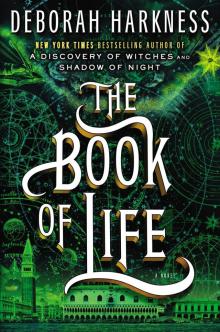 The Book of Life
The Book of Life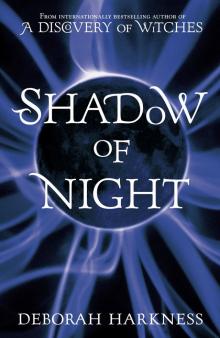 Shadow of Night
Shadow of Night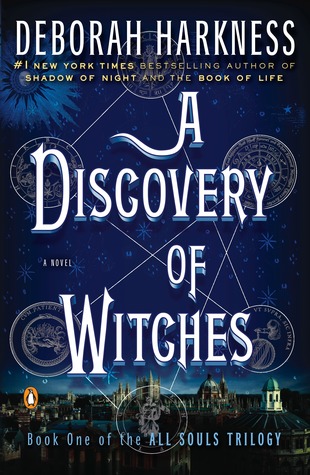 A Discovery of Witches
A Discovery of Witches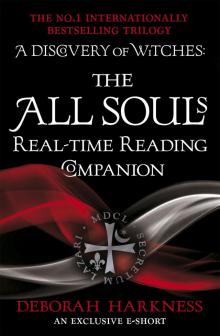 The All Souls Real-Time Reading Companion
The All Souls Real-Time Reading Companion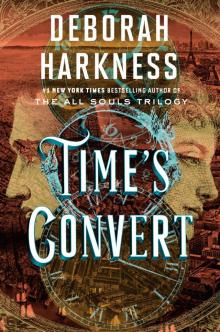 Time's Convert
Time's Convert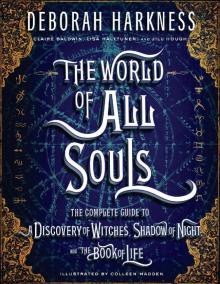 The World of All Souls
The World of All Souls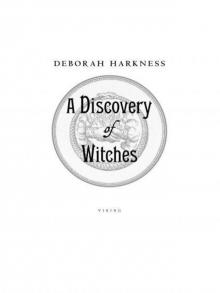 A Discovery of Witches: A Novel (All Souls Trilogy)
A Discovery of Witches: A Novel (All Souls Trilogy)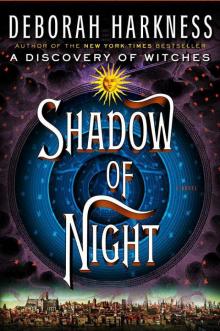 Shadow of Night: A Novel
Shadow of Night: A Novel